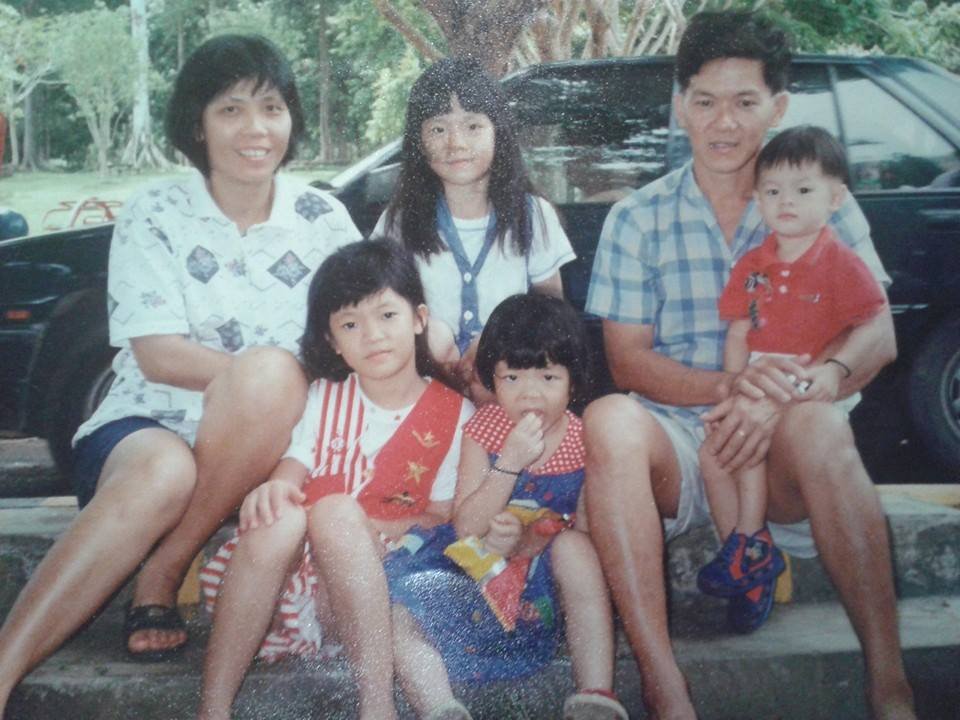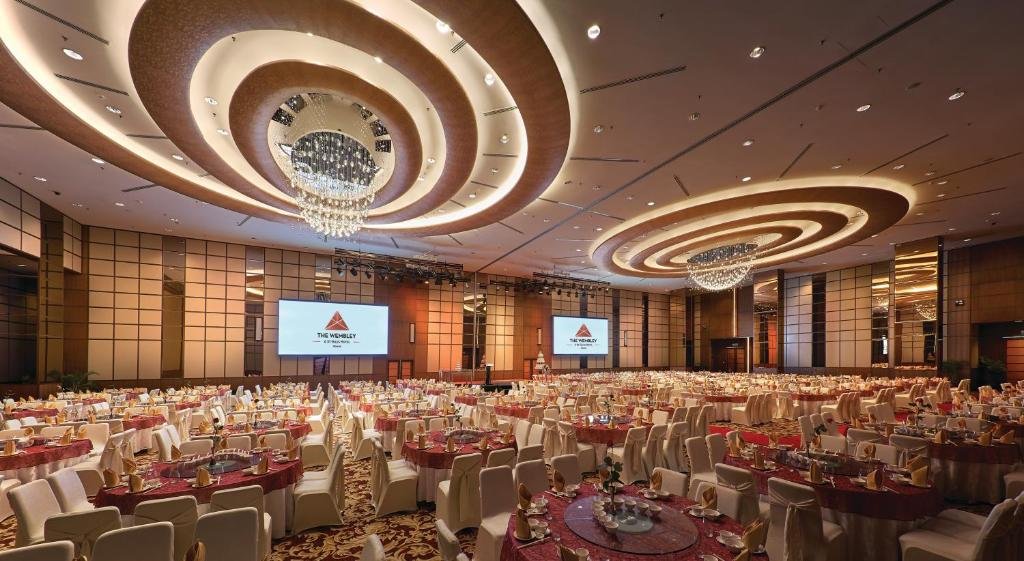About Chef Samuel

Origins
Born of Modest Means
I come from humble beginnings, born into a small town in Pahang called Mentakab, near the edge of Taman Negara – a place where dense rainforest met the rhythm of everyday survival. I was the youngest in a family of four children, and the only son after three elder sisters. In the eyes of a traditional Chinese household, I was the treasured one – a sentiment echoed in my name, Chee Sam (子琛), which means “the most beloved child.”
My father, though not formally educated, worked tirelessly in a local logging factory to provide for us. Life in the countryside was simple but tough. My mother was the pillar of the family – a homemaker who rose each day at 4 a.m. to tap rubber before the sun came up. Afterward, she would rush home to prepare us for school and spend her afternoons sewing garments to earn extra income. The long hours and needlework eventually strained her eyesight, a silent reminder of her sacrifices.
Despite the hardships, my childhood was filled with moments of wonder – running barefoot through streams, climbing trees, and exploring nature’s playground. But behind the scenes, my mother was a strong and disciplined figure who instilled values that shaped the foundation of who I am today. From her, I learned the importance of humility, hard work, and honesty – lessons that no classroom could ever teach.
All three of my sisters chose a path in education, becoming school teachers – a calling centered around nurturing and giving. That spirit of service and quiet strength runs deep in our family, and it continues to guide me in my journey as a chef.
Childhood
Roots of a Dream
My childhood was carefree in many ways, yet quietly shaped by unspoken expectations. As the only boy among three older sisters, I often played alone, finding solace in imagination and curiosity. My sisters were diligent and high-achieving—each one a role model who excelled academically. In a family where money was scarce, the message was clear: education was the only way out.
But school never inspired me. In our small town, classrooms often felt dull, and many teachers lacked the passion to ignite young minds. I struggled with rote learning, and sitting still for hours never suited me. What did capture my attention, however, were the hands-on moments—especially in the kitchen.
My mother, always multitasking between work and home, spent most of her time cooking for the family. I would watch her closely, eventually joining in—first as a helper, then as someone genuinely drawn to the rhythm and soul of cooking. It became my quiet passion.
Yet in a traditional Chinese household, the idea of becoming a chef wasn’t met with encouragement. To my parents, it was a path of hard labor and little honor. They couldn’t see a future in it. My sisters, however, saw things differently. Perhaps because they had followed the path expected of them, they recognized the fire in me—and chose to stand by it. With their unwavering support, I was able to leave home and pursue culinary school in Kuala Lumpur, setting the first stone on a path that would later define my life.
Location
My Hometown - Mentakab, Pahang
A gateway of nature’s paradise exotic ingredients entwisted in our food –
- River Fish (Patin/Anchovies) from Pahang River,
- Seed from Rubber Plantation,
- Splitgill Mushroom from Sawdust wood from Logging,
- Fermentation (Tempoyak) from Durian
- Unique plants such as Ginger Flower, Sour Cucumber
Location
Food from Hometown Pahang
Career
10 Years in Hotels
My journey with Penang began as a Roti Canai flipper during an internship at Hard Rock Hotel. Though brief, that year left a deep impression—the island’s charm and the comfort of a humble bowl of pork noodles from Hon Kei kept calling me back.
I went on to work at Genting Highlands for five years, serving thousands daily in a fast-paced casino environment. A fishing trip with a senior chef—who had never left the same job in 35 years—sparked a turning point. His quiet, predictable life made me question my own.
That moment gave me the courage to leave my comfort zone. I returned to Penang, joining the founding team at St. Giles Wembley, a new five-star hotel in Georgetown. The challenges reignited my passion for another four years —and it was there, over breakfast one morning, that I met Jacqueline.
Entrepreneurship
My Wife’s a Muse
Meeting Jacqueline changed the course of my life in ways I could never have predicted. Unlike me, she grew up in a middle-class family where her father ran his own business. From a young age, she was exposed to conversations about money, responsibility, and opportunity—lessons that shaped her into a natural entrepreneur.
While pursuing a biotechnology degree at university, she was already running small businesses. That spark, that drive to create something of her own, was always in her. And when we met, that energy ignited something in me too.
Until then, I had always played it safe. The hotel life was stable and respectable. But Jacqueline made me question what I was building, and whether I was truly living out my potential. Her belief in me—and her refusal to accept mediocrity—gave me the courage to take a leap I never thought I’d take: to leave employment and start something of our own.
The idea for a cooking class came from one of Jacqueline’s clients. She often worked with high-profile individuals and saw the rising curiosity about Malaysian cuisine. She turned to me and said, “Why not you?” It was the spark that set everything in motion.
Teaching felt natural. It was in my blood—after all, all three of my sisters became teachers. More importantly, I felt a responsibility to represent and preserve Malaysian food in a way that goes beyond street food stalls or family kitchens. In many culinary schools across Asia, the focus remains heavily on French techniques, while our own rich culinary heritage is often left in the shadows, passed down only through aging hands.
I realized then that I had now a mission—not just to cook, but to teach, share, and elevate Malaysian cuisine to the global table.
Covid-19s
When the World Stopped
Just as our cooking class business was beginning to take shape, the world came to a halt. COVID-19 hit with a force no one saw coming. Borders closed, tourism vanished, and everything we built—classes, experiences, bookings—was suddenly gone.
But survival wasn’t optional. Jacqueline and I pivoted quickly. With her background in branding, photography, tech, and web, she kept our online presence alive while I returned to my roots: cooking for the community.
That’s how Midnight Cat Noodle was born—a late-night noodle joint inspired by vintage Penang from the early 1900s. It was a tribute to the quiet fishing villages, old-town kopitiams, and street food culture we grew up with. Despite the times, it resonated with people craving comfort and nostalgia. We kept it real, kept it soulful—and it worked.
At the same time, we launched Clean Eats, a healthy meal subscription service designed for busy, homebound families during lockdown. Simple, nutritious, and flavorful, it filled a need at just the right time. In kitchens across Penang, our food brought people a sense of normalcy when everything else felt uncertain.
COVID-19 didn’t just change the business. It changed me. It proved that resilience, when matched with creativity, could turn even the hardest season into one of growth. Looking back now, those years were not a pause—they were a pivot to rethink about life.
Passion & Purpose
Preserving the Soul of Tradition
This journey hasn’t been just about food—it’s been about meaning.
Over the years, I’ve had the privilege of learning from old-school chefs whose hands told stories no recipe book ever could. Some of them are no longer with us, but I carry their lessons forward, passing the baton to the next generation in the same spirit they once passed it to me.
My work extends beyond the kitchen now. I’ve filmed and shared vlogs on YouTube—not to chase algorithms or grow subscribers—but to preserve something more valuable: tradition. I want people to feel what it’s like to cook in a traditional Malaysian kitchen. The crackling of charcoal, the rhythm of mortar and pestle, the quiet rituals that are slowly fading from our modern lives. Through film, I document these living memories before they vanish.
This journey hasn’t been just about food—it’s been about meaning.
Over the years, I’ve had the privilege of learning from old-school chefs whose hands told stories no recipe book ever could. Some of them are no longer with us, but I carry their lessons forward, passing the baton to the next generation in the same spirit they once passed it to me.
My work extends beyond the kitchen now. I’ve filmed and shared vlogs on YouTube—not to chase algorithms or grow subscribers—but to preserve something more valuable: tradition. I want people to feel what it’s like to cook in a traditional Malaysian kitchen. The crackling of charcoal, the rhythm of mortar and pestle, the quiet rituals that are slowly fading from our modern lives. Through film, I document these living memories before they vanish.
Crafting Legacy by Hand
My love for working with my hands has also led me into new territories. I’ve taken up wood carving and silversmithing—art forms rooted in heritage, patience, and soul. Creating something from raw material, shaping it through labor and intention, feels no different from preparing a meal. Both are acts of devotion.
Living in the heart of a UNESCO heritage city, I feel a quiet responsibility to protect the intangible beauty around me. Whether it’s food, craft, or story—I know now that this is my purpose: to keep tradition alive, and to do it with heart.
A person who works with their hands is a labourer. A person who works with their hands and mind is a craftsman. But a person who works with their hands, mind, and heart — is an artist.
Chef Marco Pierre White







